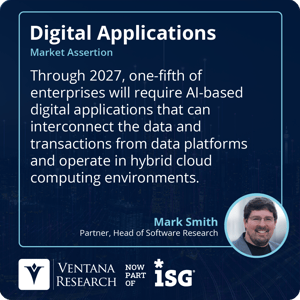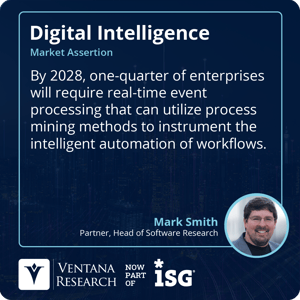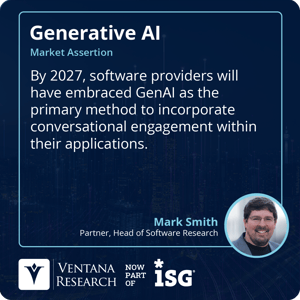Digital Business Market Agenda for 2024: Intelligence-Driven Engagement
With Ventana Research’s 2024 Digital Business Market Agenda, we continue the guidance we have offered for two decades to help enterprises derive maximum value from digital business technology investments. Through our market research and expertise, we identify trends and best practices and share insights on how to achieve technological effectiveness, particularly in key processes and systems to engage the workforce.
Digital business helps enterprises ensure technology investments are effective, supporting the resilience required for ongoing, successful operations through use of intelligent software  using modern approaches like artificial intelligence (AI). Achieving a level of refinement to ensure workforce effectiveness requires a digital strategy that can sustain any market disruption. Digital transformation intended to provide guidance on the effectiveness of systems operating across private and public computing environments has not been easy. For many, it has created more complexity. The decades-long effort to continuously introduce technology has had success, but also failed to provide the simplicity that ensures the automation and productivity needed as it lacked the engagement through digital experiences that are intelligent, not just automated.
using modern approaches like artificial intelligence (AI). Achieving a level of refinement to ensure workforce effectiveness requires a digital strategy that can sustain any market disruption. Digital transformation intended to provide guidance on the effectiveness of systems operating across private and public computing environments has not been easy. For many, it has created more complexity. The decades-long effort to continuously introduce technology has had success, but also failed to provide the simplicity that ensures the automation and productivity needed as it lacked the engagement through digital experiences that are intelligent, not just automated.
In 2023, the expectations for “virtual business” were challenged when the technology in use could not deliver optimal workforce effectiveness and outcomes. While valued by workers, some enterprises find this approach too complicated. Operating through economic cycles and inflation continues to challenge enterprises’ ability to adapt and sustain through abnormal conditions. While the effects of a recession have enterprises in many industries performing a reduction in force, the difficulty in finding talent continues to be an operational challenge. The virtual workplace and workforce require digital communications and readiness to respond and engage when required and should be at the center of an enterprise’s digital strategy.
For 2024, having an effective digital business strategy requires investments that address the need for innovation and modernization using AI-driven software that is ready for engagement. Based on our research, we assert through 2026, traditional business application software providers will transition to a new generation of applications that utilize generative AI as the standard digital experience for engagement. Enterprises now realize that digital effectiveness is more essential than transformational efforts that have not yielded expected benefits or engaged the workforce to achieve required outcomes.
Our Digital Business expertise includes nine areas of focus: Digital Applications, Digital Communications, Digital Intelligence, Digital Operations, Experience Management, Generative AI, Performance Management, Sustainability and Environmental, Social and Governance and Work Management.
Business applications have provided enterprises with continuity and resilience, but while they have delivered sufficient operations, in many cases, customer and workforce experiences have not felt digitally current nor have they utilized intelligent automation. Enterprises have been embracing the next generation of digital applications that go beyond traditional departmental silos and enable better methods for engagement. Because of these advancements, through 2027, one-fifth of enterprises will require AI-based digital applications that can interconnect the data and transactions from data platforms and operate in hybrid cloud computing environments.
have not felt digitally current nor have they utilized intelligent automation. Enterprises have been embracing the next generation of digital applications that go beyond traditional departmental silos and enable better methods for engagement. Because of these advancements, through 2027, one-fifth of enterprises will require AI-based digital applications that can interconnect the data and transactions from data platforms and operate in hybrid cloud computing environments.
In 2024, we will explore the processes and systems enterprises use to ensure the advancements of the portfolio of digital applications and technology in use and the fundamentals for evaluating existing and future investments. Our market research will identify best practices and assess the opportunities enterprises can gain from software providers. Our dedicated focus in digital applications will embrace our business software research and insights to provide effective guidance about the aspects of digital technology necessary to provide the automation and intelligence desired.
Digital communications enable enterprises to engage the workforce and efficiently interact and collaborate in a secure manner with its customers, partners and suppliers. Our agenda reflects our work to assess technology to guide enterprises’ use of a range of communication methods—from unified communication and videoconferencing to communication platforms as a service (CPaaS)—that are converging into the field of digital communications. Through 2028, one-quarter of enterprises will use AI to redirect digital communications to intelligent automation methods for response and resolution.
The myriad software providers offerings adopted by an enterprise to support communication and collaboration can create disruptions that truly require a unified approach for enterprise readiness. We will examine how enterprises utilize analytics with AI and machine learning (ML) to identify methods for effective communication and assess the intersection of digital communication and other applications and tools needed for collaboration and operations. Whether workers, managers or partners need to interact, enhanced technology must facilitate an engaging work experience. Our market research is designed to produce best practices and insights that help enterprises evaluate and prioritize digital communication options. We will publish a Buyers Guide on software providers and products that span from platforms to suite offerings.
Insights can only be gained by harvesting data that has the potential to provide digital intelligence. Processing the data using advanced analytic techniques such as AI and ML can generate insights that can help enable workers to take best actions and managers to make better decisions. Enterprises should evaluate how well they are harvesting their data from digital processes and whether they are actually providing the intelligence they desire. Many enterprises may not use efficient technology to streamline the analytics within digital intelligence processes.
generate insights that can help enable workers to take best actions and managers to make better decisions. Enterprises should evaluate how well they are harvesting their data from digital processes and whether they are actually providing the intelligence they desire. Many enterprises may not use efficient technology to streamline the analytics within digital intelligence processes.
Effective digital intelligence also operates in real time. Events created from machines and interactions can be processed through correlation and relevance to acquire the necessary insights. By 2028, one-quarter of enterprises will require real-time event processing that can utilize process mining methods to instrument the intelligent automation of workflows. This includes digital events from any systems that support processing within how the enterprise operates and not just how the systems operate. Our market research on digital intelligence will investigate the processes and technologies that can transform enterprises’ ability to operate in the most expedited manner possible.
An effective digital operations strategy unifies the bifurcated approach to digital applications and intelligence like AI that exists in enterprises. These digital processes need to be embedded however and wherever operations support processes across all channels and systems. Our market agenda focuses on the importance of comprehensive digital operations and the essential priority to empower people and processes with information so that they may operate more effectively digitally. By 2027, one-half of enterprises will have the majority of their services digitally enabled, requiring operations software that can monitor and act on disruptions.
Our examination of digital operations will explore how dedicated technologies enable the effective governance and risk mitigation necessary to support distributed activities in related systems that operate across hybrid-computing environments. The effective use of best practices can guide the integration and interconnection of digital operations while mitigating risks through use of technological advancements.
Our market research on digital operations will examine lessons learned from 2023 and earlier that still plague digital effectiveness across the enterprise, including applications for customer-facing processing. We will evaluate new methods for human-to-machine and machine-to-machine contact for operations across digital processes.
Digital experiences across business and processes should be the nucleus for continuous improvement to enable engaging experiences for the workforce, customers and products and services. Our focus on experience management is intended to ensure the effectiveness of all processes and technologies used to increase the impact of investments through satisfaction. This dedicated approach to experiences can enable marketing, sales and supply-chain service agents to distinguish their operations in a differentiated manner and is focused on intelligence as much as automation.
It is insufficient to focus solely on the customer experience, journey and life cycle. Managing the experience of everyone in the enterprise—and all constituents supporting this imperative—is key to measuring and improving the effectiveness and value of these interactions. Through the use of AI, the personalization of experiences is possible at scale, and without it, continues the path of stale or antiquated user experiences. By 2027, one-fifth of enterprises will use AI to dynamically personalize the digital experiences of interactions and determine where GenAI is an effective engagement method. The necessity of optimal experiences to engage and guide people and processes—as well as digital and technological components—are essential for the corporate brand as well as the human connection. Our market research will guide enterprises' needs, plans and attitudes on experiences for enterprise- and business-focused—processes and interactions.
Harnessing the power of AI requires embracing digital experiences that are human in nature. GenAI offers the opportunity to innovate and simplify experiences for customers and the workforce who interact with applications and systems used across the enterprise. Effectively incorporating digital modernization enables a higher level of velocity in how an enterprise operates and utilizes the foundation of AI. We assert that through 2027, one-third of enterprises will embrace GenAI as the digital experience for their processes and applications used by the workforce.
workforce who interact with applications and systems used across the enterprise. Effectively incorporating digital modernization enables a higher level of velocity in how an enterprise operates and utilizes the foundation of AI. We assert that through 2027, one-third of enterprises will embrace GenAI as the digital experience for their processes and applications used by the workforce.
Taking advantage of GenAI requires skills and technology to effectively manage the knowledge foundation of an enterprise that the system will interact with. These large language models are developed and maintained to support the natural language processing interfaces that represent the digital experience in language by text or voice.
This significant advancement in digital technology provides an opportunity to identify and invest in new AI methods that enable streamlined engagement with systems throughout the enterprise. GenAI must also engage with workflow and robotic process automation technologies to provide operational efficiency created from inquiries and questions. Additionally, it is essential to have a governance- and policy-focused approach to ensure that use of GenAI adheres to corporate and regulatory guidelines. Our market research will provide a Buyers Guide on software providers that offer AI platforms. The use of GenAI will be assessed across our portfolio of Buyers Guides.
Performance management is the process of efficiently linking the enterprise to an individuals’ strategies and tactics for desired operational outcomes. This fundamental approach to managing objectives and key results is growing in business importance but is fundamentally transforming with the use of AI to better understand and guide the workforce. We assert through 2027, software providers will use GenAI to develop new methods for performance management that is engaging and can guide actions for improvement.
The complexities of digital business have challenged enterprises to ensure alignment to desired outcomes and performance within specified time periods. Business effectiveness and resilience requires dedicated applications designed for performance management across the workforce, supporting organizational goals and key performance indicators to align work to the objectives defined at any level. The unification of performance management with work management and digital communications must advance further to operationalize the actions of the workforce.
Digital innovation in technology—from analytics to AI/ML—has accelerated the potential to gather intelligence to guide performance management processes that can detect variances and issues impacting overall outcomes. Our market research will help enterprises identify the best methodologies and processes in applications that support the requirements for performance management. Combined with digital technologies like collaboration, communication, conversational computing and mobile technology, these applications can deliver the desired experience for everyone in the workforce.
Sustainability and ESG has become an essential priority for the entire executive team. Many enterprises now have a chief sustainability officer to ensure a balance in the mission of profitability and efficiency to protect the environment and planet. Finding the balance is difficult when division of responsibility requires goals and incentives to achieve this level of opportunity. Success requires leaders address the objectives for sustainability through a technology blueprint as there is not one application to support this focus area, and a framework founded on data, analytics and planning is required to manage sustainability effectively. We assert that through 2026, the limited set of business planning support in sustainability and ESG software will cause a transition to those that provide critical forward-looking capabilities.
The span of sustainability management is not limited to the direct activities and operations of an enterprise but also includes those of the extended demand and supply chain—the activities of anyone associated with the initiative, including people and resources. The science behind analytics and data to calculate an enterprise’s carbon footprint, for example, requires incorporating competencies, skills and knowledge from the industry into the enterprise. Planning and reporting must complement efforts to guide future direction. For many enterprises, disparate activities to market and report corporate sustainability efforts does not necessarily translate to the processes and technology that support the initiative. The dedicated technology and team that works collaboratively across the enterprise to address change must be managed through an effective portfolio and work management to ensure progress is made over time.
Our continuous market research will examine best practices and the technological impact of sustainability and ESG. Our Buyers Guide on ESG will assess software providers’ offerings as they support operations and analytics requirements. Our expertise will help enterprises prioritize technology and software providers in a common blueprint to focus on the necessary sustainability processes that can ensure adequate progress.
Work management is the effective use of the portfolio of people and resources with technology that enable workers to conduct tasks and activities, delivering a specific outcome in a timely and efficient manner. It is not simply about being productive—it encompasses the experience of how work is done digitally to meet business objectives. While this might seem obvious, most of the software used by enterprises is not designed around defining and managing how work is done, but rather focuses on the utility of what work accomplishes. This emphasis on productivity can have the unintended consequence of negatively impacting the effectiveness of the software utilized.
As enterprises look to engage the workforce in the structured work of projects—and sometimes unstructured aspects of tasks—the juncture of these is where the opportunity lies to simplify work and guide it to expected and timely outcomes. This concept applies to work conducted in customer-facing areas across sales and service; marketing and operations that support front-office activities; or IT, manufacturing and supply-chain activities that are more structured and require a heightened sense of detail and governance. Our continuous market research will identify rapidly evolving best practices in the use of task and program management, blended with collaborative computing, to provide an engaging work experience across the entire enterprise. One significant change is that enterprises need to have better predictive insights on the status and confidence level of work being accomplished on time, as that matters to the expected outcomes desired. We assert through 2028, two-thirds of enterprises will invest into software that provides the intelligence in their portfolio of project management to avoid unnecessary risk and produce expected outcomes. We will have a Buyers Guide on Work Management to help assess the ability of software providers to meet the requirements of an enterprise.
Every enterprise, no matter the industry or size, is a digital business capable of improving areas that impact organizational agility, support the needs of the workforce and focus on the sustainable efforts of everyone. While it is essential to place a priority on the digital experience, the fundamentals lie in the focus of the business and applications that enable an enterprise to balance priorities holistically to ensure the readiness and resilience of the enterprise.
Once an enterprise establishes priorities for how it will focus its digital business investments, the path forward will become clear. Desired outcomes will be attained with effective preparation and strategy to achieve the enterprise readiness and engaged workforce with the resilience required. To ensure your path is on course with the right digital priorities for 2024 and beyond, use this expertise and these focus areas as a filter for your own enterprise efforts.
Subscribe to our Ventana Research community at no cost to stay up-to-date on our 2024 research efforts. Check out our Digital Business expertise and focus areas for the detailed agenda and continuously updated 90-day calendar as well as more research facts and best practices.
Regards,
Mark Smith
Authors:

Mark Smith
Partner, Head of Software Research
Mark Smith is the Partner, Head of Software Research at ISG and Ventana Research leading the global market agenda as a subject matter expert in digital business and enterprise software. Mark is a digital technology enthusiast using market research and insights to educate and inspire enterprises, software and service providers.









